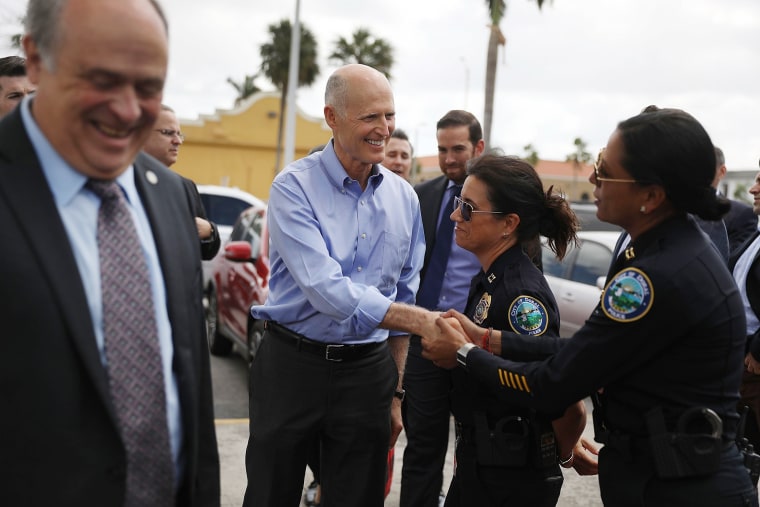WASHINGTON — Florida Gov. Rick Scott will run for Senate, challenging longtime incumbent Democrat Sen. Bill Nelson and turning up the heat in what will be one of the nation's most-watched midterm election battles.
Scott's move sets up a contentious and pricey battle for Democrats to defend the seat they've held for almost two decades, but also brings President Donald Trump's possible impact on down-ballot races into close focus yet again.
Standing among supporters in Orlando Monday, Scott announced his candidacy, promising to change the "dysfunctional, old, tired thinking" in Washington while pushing a jobs-focused platform and advocating for term limits on lawmakers.
Moments before greeting his supporters, who waved "let's get to work" signs, Scott gave his Facebook followers an early, if slightly unpolished, preview of the day's big news. As he made his candidacy Facebook official, his face was obstructed by a blue-hued slate that read "the program will begin momentarily," and he garbled his words: "You’re the first to know: I am gonna run for the U.S. Senay—U.S. Senate representing the great state of Florida," he said.
Scott, sporting a U.S. Navy-branded baseball cap, went on to say that Washington "can work" and "must work" for Americans. "We're gonna make sure it works for Florida and for all of us," he said.
Scott's entrance into the race marks another key recruitment for the president, who for months has urged the Florida governor and longtime Trump supporter to run for the seat, held by Nelson since 2000. Trump considers Florida his second home and has spent most winter weekends as president at his Mar-a-Lago club in West Palm Beach.
Nelson responded to the news of Scott's challenge Monday via his campaign Twitter account, saying that he has "always run every race like there's no tomorrow — regardless of my opponent."
"While it’s clear that Rick Scott will say or do anything to get elected, I’ve always believed that if you wake up every day and if you try to do the right thing, the politics will take care of itself," Nelson said.
In an interview with PoliticoMonday morning, Scott wouldn't cast himself in the mold of a "Trump Republican," nor would he say if he wanted the president on the campaign trail with him.
"I'm going to campaign for this job. I know there are going to be people that like what I'm saying. There are going to be people who don't like what I'm saying," the Florida governor told Politico, which first reported the news that he would take on Nelson. "Let's go back to 2010. No one, I don't believe hardly anybody, endorsed me in 2010. Did that phase me? No. Whether they do or whether they don't, I’m doing what I believe in."
But strategists are skeptical about whether Trump will be a boon to candidates, like Scott, that he anoints. Past races in Alabama, Virginia and Pennsylvania's 18th congressional district have all seen Trump's chosen candidates felled by Democrats.
"(Trump)'s his own brand, his own thing, and we’ve not really seen any evidence that him anointing you makes you a winner," one Florida strategist with ties to both Trump and Scott told NBC News.
Veteran political watchers have raised flags about Nelson's ability to keep his seat. Charlie Cook of the Cook Political Report put Nelson at the top of his "most vulnerable" Democrats list, while pointing out that the movements on gun control in the wake of the Parkland, Florida, shooting and teachers strikes across the country could provide momentum to Democrats in tough spots across the country.
Those marches and movements are "all stirring up people that aren't in the Republican base," he said.
The gun issue is one that will certainly play a key role in Scott's race. Scott signed new gun restrictions into law last month — a response to a school shooting at Marjory Stoneman Douglas High School that left 17 people dead. The measure raises the age to buy all firearms to 21, imposes a three-day waiting period for most gun purchases, allows trained school workers to carry handguns, provides new mental health programs for schools, and restricts access to guns from people who show signs of mental illness or violence.
Another longtime Republican Florida strategist called that move "a self-inflicted ding” by Scott that could harm him with voters who strongly support the National Rifle Association and the Second Amendment.
"You don’t touch Second Amendment rights," the GOP strategist said, while telling NBC News they still saw the race as "Scott's to lose."
Nelson, on the other hand, has pushed for gun control measures alongside students from Parkland, who have taken the national spotlight in their crusade for stricter gun laws from lawmakers both in Florida and Washington.
